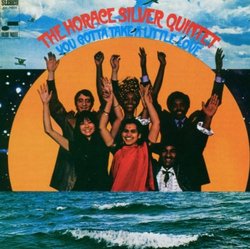MELODIES FOR YOUR MALADIES
TuPac Man | West Virginia | 04/06/2007
(5 out of 5 stars)
"Horace Silver always delivers; "You Gotta Take A Little Love" is no exception.
While the inspiration on this session isn't as sustained as on "The Tokyo Blues," highlights like the grits-n-gravy "Down and Out" and the superlative "Brain Wave" elevate this to near-classic status."
Groovy, but a throwback
Anthony Cooper | Louisville, KY United States | 06/20/2007
(4 out of 5 stars)
"This is a Horace Silver Blue Note session from 1969 which has recently been re-issued. Horace has hornmen Bennie Maupin and Randy Brecker, and Billy Cobham on drums. Despite the fusion lineup, you get straightahead jazz. The opener and title track is a R&B shuffle which, unfortunately for Bennie Maupin, shows he's not very comfortable with that style. "The Risin' Sun" is another jaunty number with a tempo that slows and surges in spots. "It's Time" is a softer, slower song with a pretty melody. Bennie Maupin opens "Lovely's Daughter" with a flute solo. "Down And Out" is a blues. I'm finding it difficult to be too descriptive, since each song is 4 - 7 minutes long, and has the basic head-solos-head format. "The Belly Dancer" has an Asian cast, and "Brain Wave" has a slightly exotic melody. Aside from the first song, Bennie Maupin sounds good, and Randy Brecker sounds virtuostic throughout. Compared to the other stuff that came out in 1969, like "In A Silent Way" and various lesser-known avant-garde jazzers, this CD sounds hopelessly out of style. Proper enjoyment, then, comes from imagining it came out in 1963 (and does it really matter whether it was recorded 44 or 38 years ago?) and pretending the album cover art was daringly ahead of the curve.
"
Still cookin' like always..
W. Morgan | Orange, NJ | 05/30/2007
(5 out of 5 stars)
"I have to admit that I love Horace Silver's music. His style is unmistakable, and he has that 'delicious' ability to combine the intricate harmonies that are characteristic of the idiom commonly referred to as 'Jazz', with the music's rhythmic origins. Whatever composition he performs or pens, Horace Silver's piano style is so distinctive that to me it imbues familiar melodies with an exotic tinge."


 Track Listings (7) - Disc #1
Track Listings (7) - Disc #1